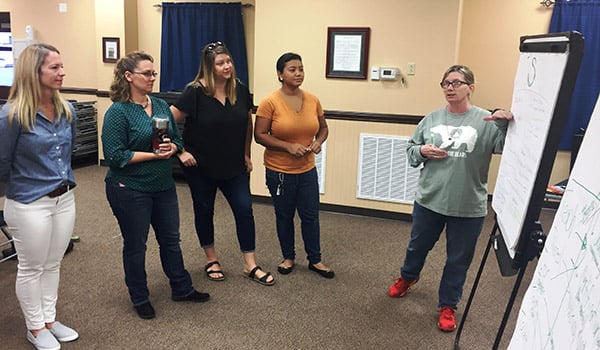
Family Forum / By MaryLou Royar: In the corporate world, we often hear how important it is for business professionals to have a mentor.

160th SOAR STRONG committee members gathered on a Saturday to define the pillars for STRONG. From left to right: Katie Clemmons, Lisa Wilson, Faith Willis, Dinah Campbell and Suzanne Logue. / 160th SOAR STRONG COURTESY PHOTO
Mentoring is also an important component of Army leadership and is mandated by Army Regulation (AR 600-100, para. 1-9(f)). Not only do green suiters benefit from the mentor-mentee relationship, but spouses of service members can benefit from mentorship as well. Mentorship in the military spouse realm has existed informally, and I personally have learned the ropes about Army spousal responsibilities from several military spouse mentors over the years. This article will discuss some new mentorship programs for military spouses, as well as informal ways to provide mentorship to all military spouses.
Military Spouse Advocacy Network (MSAN)
For new military spouses in need of a mentor, one resource is the MSAN, a nonprofit organization www.militaryspouseadvocacynetwork.org. Founded by Air Force spouse Verenice Castillo in 2013, the MSAN was established to connect new military spouses with mentor spouses with similar interests and branches of service. In 2011, Verenice served as a key spouse mentor and was instrumental in establishing spouse mentorship programs at the Air Force installation level. After being named Air Force Spouse of the Year by Military Spouse Magazine in 2013, Verenice saw the need to expand the reach of spouse mentorship and thus, the MSAN was created.
Currently the MSAN has close to 400 new spouses assigned to mentors from all branches of service, the National Guard, and the Reserves. Once a spouse is enrolled in the MSAN’s Peer-To-Peer Mentorship Support Program, he or she will be paired up with the same mentor, who will stay with them throughout the process. Also, the MSAN recently launched the Mentoring and Resource Center, a virtual space where new spouses can find educational and supportive resources to help them transition from civilian to military lifestyle. If you are a new military spouse or a spouse who would benefit from guidance from a military spouse mentor, the MSAN would be a great place to start. If you are interested in becoming a mentor with MSAN use the “Contact” link then “Join Us” and choose “Become a Mentor”.
Not just for new military spouses, mentorship can benefit military spouses at all levels of experience. At the general officer level, Melissa Helmick, spouse of LTG (Ret.) Frank Helmick, started the General Office Spouse Mentorship Program in 2016. This program pairs up spouses of current and retired GOs to receive advice and support on a one-to-one basis. Monthly emails are also sent out that address a variety of issues, such as protocol, gift giving, and coordinating calendars.
RISE
In the special operations community, 5th Special Forces Group at Fort Campbell, KY recently established a spouse mentorship program known as RISE (Relationships, Information, Support and Empowerment) of the Legion. The goal of RISE is to provide information and opportunities to 5th Group spouses through mentor relationships that take into consideration the special operations lifestyle. A committee of representatives from each battalion decides what topics will be discussed at upcoming RISE events. So far, RISE held a “Life in the Legion” event and has planned an upcoming event on stress management.
STRONG
Also in the aviation community, the 160th Special Operations Aviation Regiment (Airborne) (SOAR) at Fort Campbell, KY is starting a mentorship program for its spouses known as STRONG (Serve, Teach, Relationships, Opportunity, Network, Growth). Different from an FRG, the STRONG program is not tied to the chain of command or rank and provides spouses with more individualized development and networking capabilities. STRONG is already off to a good start – about 50 160th SOAR spouses recently attended an ice cream social that launched the STRONG program.
Even without a formal program, spouse mentorship can still take place at the installation. Here at Fort Campbell, the spouse of the deputy commanding general-operations and I meet once a quarter with the brigade command spouses to hold informal “mentor meetings.” Usually over lunch or coffee, it is a designated time to discuss issues unique to brigade command. Recently, the spouse of a brigade commander who just left command gave excellent lessons learned from her time in that role.
The same type of mentorship gatherings can be held between brigade and battalion level spouses or between battalion and company level spouses. There doesn’t even need to be a “meeting” per se, just a willingness of senior spouses to answer questions posed by newer or junior military spouses. No matter what form, military spouses will be better equipped to face any challenges if they are involved in a mentorship relationship. Mentorship has been, is, and will continue to be an important part of Army culture.
Special thanks to Verenice Castillo, Melissa Helmick, Sandy Brennan, (101 ABN DIV), Cher Powers (5th Special Forces Group) ,and Karen Harper (160th SOAR) for their assistance in the preparation of this article.
MaryLou Royar is the spouse of BG K. Todd Royar, Deputy Commanding General-Support, 101st Airborne Division (Air Assault), Fort Campbell, KY;
Judy Konitzer is the family forum editor for ARMY AVIATION; questions and suggestions can be directed to her at This email address is being protected from spambots. You need JavaScript enabled to view it..”>This email address is being protected from spambots. You need JavaScript enabled to view it..








